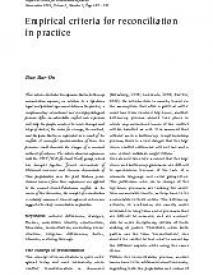Empirical criteria for reconciliation in practice
This article illustrates the opinion that a bottom-up recondliatim requires, in addition to a top-down legal and political agreement between the parties, a complementary educational and social-psychological process. After an intractable conflict such a process will help the people involved to work through and let go of hatred, the desire for revenge, the mistrust, and the pain that were imprinted as a result of the conflict. A successful synchronisation of these two processes could diminish the danger of a renewed outburst of violence. The article discusses experience with the TRT (To Reflect and Trust) group, which has brought together Jewish descendants of Holocaust survivors and German descendants of Nazi perpetrators over the past thirteen years. Lessons learned from these experiences are applied to the current Israeli-Palesinian conflict. In the course of this discussion, the concept of reconciliation is critically examined,. Several empirical criteria are suggested to study reconciliation in practice. Keywords: cultural differences, dialogue, Hudna, monolithic identity construction, Musalaha, reconciliation, secondary reconciliation, religious differences, Sulha, Ubuntu, working through
Geachte bezoeker,
De informatie die u nu opvraagt, kan door psychotraumanet niet aan u worden getoond. Dit kan verschillende redenen hebben,
waarvan (bescherming van het) auteursrecht de meeste voorkomende is. Wanneer het mogelijk is om u door te verwijzen naar de bron
van deze informatie, dan ziet u hier onder een link naar die plek.
Als er geen link staat, kunt u contact opnemen met de bibliotheek,
die u verder op weg kan helpen.
Met vriendelijke groet,
Het psychotraumanet-team.
Reference:
Dan Bar-On | 2005
In: Intervention: the international journal of mental health, psychosocial work and counselling in areas of armed conflict, ISSN 1571-8883 | 3 | 3 | 180-191
http://www.interventionjournal.com/sites/default/files/180_191_Dan.pdf
In: Intervention: the international journal of mental health, psychosocial work and counselling in areas of armed conflict, ISSN 1571-8883 | 3 | 3 | 180-191
http://www.interventionjournal.com/sites/default/files/180_191_Dan.pdf


